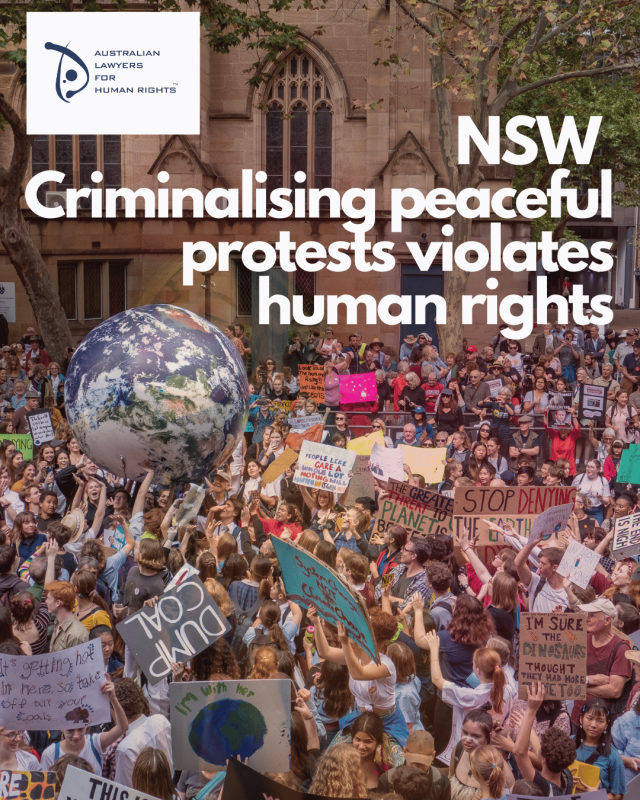NSW parliamentarians must take urgent action to protect our democracy from draconian anti-protest laws

ALHR has written to members of the NSW Parliament to express serious concern regarding the conduct of NSW Police during the peaceful demonstration held on Friday, 27 June, outside SEC Plating in Belmore Event.
It has been reported that a protester, Hannah Thomas, was seriously injured during an interaction with police and may sustain permanent eye damage.
Reports from independent legal observers also indicate that police gave move-on orders to individuals walking on the footpath near the intended protest site, on the basis of the protest being ‘unauthorised’. The Law Enforcement (Powers and Responsibilities) Act 2002 (NSW) does not allow police to move individuals participating in a public assembly on for this reason. Police may have used the recently introduced places of worship move on powers in the Crimes Amendment (Places of Worship) Act 2025 (NSW) (the PoW Act) in relation to one person during the incident.
Section 7 of the Police Act 1990, obliges NSW Police officers to preserve the rights and freedoms of individuals and to exercise their authority responsibly.
These events highlight concerns ALHR has consistently raised prior to each rushed and knee-jerk anti-protest law passed in NSW over recent years. These draconian laws have led to a criminalisation and police powers creep in NSW that leaves increasingly less space for people to exercise their fundamental human rights to public assembly and protest.
Prior to the PoW Act’s passage ALHR warned the NSW Government that the new move on powers were over broad, ill defined, likely unconstitutional, and would be used, not to protect worshippers, but to shut down peaceful assemblies and democratic expression.
As an organisation committed to the protection of the people of New South Wales’ internationally recognised human rights, ALHR is deeply troubled by NSW’ draconian anti-protest laws and increasingly aggressive and violent police responses to people exercising their internationally recognised human right to peaceful assembly.
Pursuant to international law, the right to peaceful assembly, includes the right to peaceful protest and belongs to all individuals and groups in NSW regardless of age, ability, race or any other characteristic and irrespective of the degree of public support for the purpose of the gathering.
ALHR is seriously concerned by the growing normalisation of language such as “unauthorised protest” by the NSW Police – terminology that appears to seek to justify disproportionate uses of police powers in responses to the legitimate exercise of the right to peaceful protest. Notification regimes that require people to apply for permission or authorisation to organise an assembly, have been described by the United Nations Human Rights Council (UNHRC) as “undercutting” the idea that peaceful assembly is a basic right. The UNHRC has stated clearly that, “ a failure to notify the authorities of an upcoming assembly, where required, does not render the act of participation in the assembly unlawful, and must not in itself be used as a basis for dispersing the assembly or arresting the participants or organizers.”
As a party to the core United Nations human rights treaties, Australia has recognised that freedom of assembly is a fundamental human right and, in consequence, NSW must protect it.
In the July 2020 UNHRC issued General Comment No. 37 on Article 21 (Right of peaceful assembly), providing comprehensive guidance on the scope and content of the right to peaceful assembly and the obligations of ICCPR State parties, including Australia.
General Comment 37 specifically notes that:
- the fundamental right of peaceful assembly extends to all gatherings for peaceful purposes. Article 21 of the ICCPR protects peaceful assemblies wherever they take place: outdoors, indoors and online; in public and private spaces; or a combination thereof. Such assemblies may take many forms, including demonstrations, protests, meetings, processions, rallies, sit-ins, candlelit vigils and flash mobs. They are protected under article 21 whether they are stationary, such as pickets, or mobile, such as processions or marches;
- an assembly cannot be deemed violent or non-peaceful just because it involves disruption of movement or civil disobedience;
- States have an obligation not to interfere with peaceful assemblies without compelling justification, they are obligated to facilitate them;
- authorities should first apply least-intrusive limitations on assemblies, prohibition should be a last resort ;
- restrictions on assemblies must not be based on the message of the assembly or the degree of public support for the purpose of the gathering;
- assemblies must be allowed to be held within sight and sound of their target;
- “Public order” cannot be used to justify overbroad restrictions;
- assemblies may only be dispersed by law enforcement agencies in exceptional cases;
- notification regimes that require people to apply for permission or authorisation to organise an assembly are contrary to the idea that peaceful assembly is a basic right.
Mary Lawlor, the United Nations special rapporteur on the situation of human rights defenders, has expressed that she was “shocked by the reported injuries sustained by a peaceful protester in Sydney last week during the course of her arrest by New South Wales Police.”
“The increasing crackdown on peaceful protest, and the use of excessive force to disperse peaceful protest, is a very worrying trend that is spreading like wildfire through democracies, often fuelled by draconian laws restricting the right to freely and peacefully assemble,” Lawlor said. “Each time such a law is introduced, it’s one further step away from international human rights law.”
The people of NSW need their elected representatives to show leadership in upholding democracy, the rule of law, protecting civil liberties and resisting draconian or authoritarian measures. We hope you will speak out in support of a healthy democracy, accountability and the right to peaceful protest.



